Contribute
| Resilience And Freedom - IDC Seminar Report On India In British Period - Part II |
Bijoy Misra
01/30/2020
Resilience and Freedom- IDC Seminar Report on India In British Period - Part II The seminar on the British Period as the seventh seminar in the series Let us Discover the Cultural History of India was held on November 30, Saturday at Bemis Hall in Lincoln. The report is divided into two parts: part I covering the guest lectures and the recitations and part II covering the presentation by the IDC researchers on the IDC six tracks. The part I of the report has been published in http://www.lokvani.com/lokvani/article.php?article_id=16322. The past seminar information is archived in http://www.indiadiscoverycenter.org/seminars/ The presentations were moderated by the Poet and Scholar Dr Sajed Kamal. Coming from a poet’s family in Bangladesh, Dr. Kamal has been a voice of reason and activism in Boston for five decades. He is a founder member of the South Asian Poets of New England, currently operated by IDC. Dr Kamal introduced all topics and the speakers. The Executive Director Dr Satyendra Sharma formally thanked him for his support and participation in the IDC work. Geography and People: The track was presented by Ms. Hardeep Mann. The British colonization was the result of the European expansion that began in the 1500’s because of instability and serious food shortage in Europe. The British arriving as traders gradually took control of the country through manipulation and deceitfulness. Having extracted food, there was effort to change the grain production to exportable cash crops. A money lender class was created to support the scheme. The landless people were recruited to the Army and many perished. More perished through artificial famines and poor health care. Eventually protests and rebellions took place. Mohandas Gandhi led the Freedom Movement. The British left India after dividing her into two parts under a religious pretext. Ms. Mann surveyed various sectors of people with pictures and anecdotes. There were two questions. Q. How does British colonialization contrast with Islamic invasion? A. Islamic rulers wanted to make India their home. They wanted more conformity to religion. They helped build the economy. The British were purely exploitative. They used India as a resource base to support their home and other adventures in the world. India’s economy was destroyed and population perished. Q. How was the prevailing caste system help the British in their rule? A. The British did use the caste as a wedge to set up communities against each other. They manipulated privileges through artificial divisions and the economic pressures hardened the divisions further. Economy and Politics: The track was presented by Ms. Bhavani Venkineni. The British colonialization destroyed India’s economy. Heavy taxation and coercion by middlemen for cash crop production destroyed farmer’s morale and the affected the fertility of the soil. India’s GDP dropped from a 24.4% to a paltry 4% during the period. Through tariff structure and punishments, the British succeeded in destroying the domestic production of goods and textiles. An element of European racism was introduced by creating classes of privilege. The freedom movement was not easy to be organized. It took a strong sacrifice and massive mobilization to throw the British out of India. There were two questions. Q. When did the first rebellion against the British take place. A. Sepoy Mutiny is dated as 1857. It was a soldiers’ revolt against the British rules. Q. What was the British Policy towards India’s Politics? A. The British had weakened India and wanted to make sure that India remained a satellite to Britain. They mostly succeeded. India is still trying to reconstitute herself to provide food and freedom to all her people. Philosophy and Religion: The track was presented by Dr. Satyendra Sharma. The Islamic atrocities and the follow up British occupation broke India’s creative framework. The traditional philosophical discourses were converted to religious defensiveness, creating hundreds of cults and groups. The division of the society was abetted by the British by granting artificial economic privileges and social prestige. Sectarian conflicts were engineered and did erupt frequently. Call for freedom was camouflaged in religious literature but eventually did succeed to unite people through religious and social reforms. India did get back her strength in spirituality and fought against the occupation as one nation. There were two questions. Q. How did Swami Vivekananda view the British Rule in India? A. There is no available record of political views, but he called for the freedom of India. He did harbor the view that India has to learn much from the industrial society in the west. Q. What is the underlying Indian philosophy behind all religions? A. Nothing specific came out in this period. Respecting another object irrespective of its origin or perceived value is the basis of India’s cultural tradition. Language and Literature: Mr. Prem Nagar presented the track. Languages played crucial role for India’s freedom and also in its division. English was imposed that replaced Persian in administration. Hindi and Urdu languages competed and eventually divided the nation. The Education system was disrupted and western education system was imposed. A liberal intelligentsia did emerge. English writers did emerge among the native Indians and liberal views were imported from the west. Bhakti literature transformed to nationalist literature calling for self-rule. Sanskrit Texts were translated in English, German and French Languages. Use of media and newspapers transformed literature creation and consumption. There was a comment and a question from the audience. Com. Punjabi poetry was had surged to high creativity during the British Period. A. Maharaja Ranjit Singh had created a large Sikh empire in the northwest that lasted most of the nineteenth century. Q. Were the native Indians inspired by the British to develop literature? A. Indians possibly have a cultural inclination to writing and storytelling. English education opened doors to evaluation and criticism. Art and Culture: The track was presented by Dr. Krishnakali Dasgupta. From food, clothing, to art and socio-cultural expression India painfully internalized her loss of the native systems and methodology. Advent of new technology and ideas helped create a fresh Indianized perspective of all that was imbibed. Printing press helped in mass circulation of books and newspapers. Mass communications enabled to create the voice for freedom. Cataloging of India flora and fauna and landscape through pictures became a sophisticated art. Stage theater and stage productions of dance emerged and were used to convey the nationalist voice. Eventually the art turned to celluloid and India’s movie industry was born. The presentation was eloquent with massive picture displays. There was appreciation for new research and the exposition of much new information. Science and Technology: The track was presented by Dr. Bijoy Misra. The imposition of English as the medium of instructions caused a systematic destruction of the traditional Indian educational system. Though the British were introducing new technology, the native Indians were denied opportunities in research. Some of the old Observatories survived and astronomical works were compiled. The nationalists succeeded in establishing a privately funded center to help new scientists. Indian Association for Cultivation of Science eventually helped C V Raman to win the Nobel Prize. There was revival of Indian science with research in physics, chemistry, mathematics, statistics and Botany. Disruptive as it was, the new technology in transport, textiles and food processing changed the social structure in India. There was one question from the audience. Q. When did the monetization first come to use in India? A. Evidence suggests that Kushanas introduced metal coins in circulation. Adding monetary value to a product or as a part of administrative structure appears to be formalized in the Islamic period. India Discovery Center will arrange full-day track seminars for the different tracks Under a theme “Evolution of India’s Cultural History†in the second half of this year. More information will be posted at the website https://www.indiadiscoverycenter.org. India Discovery Center is a nonprofit educational organization based in Lincoln, MA.
You may also access this article through our web-site http://www.lokvani.com/
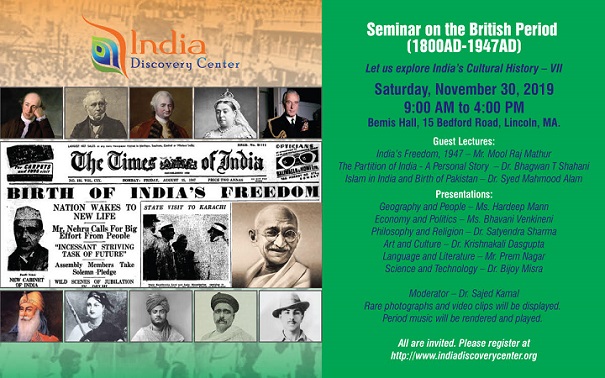
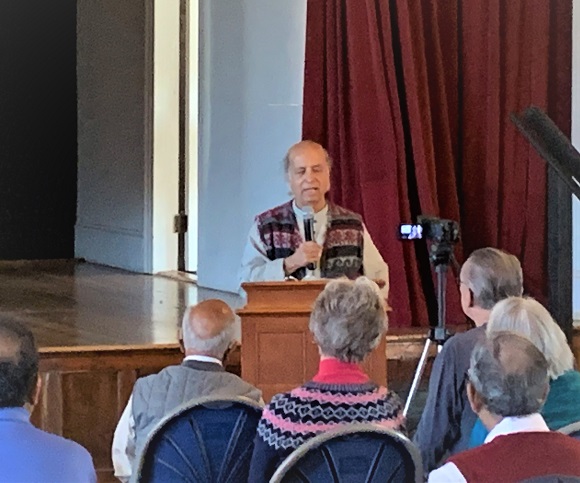
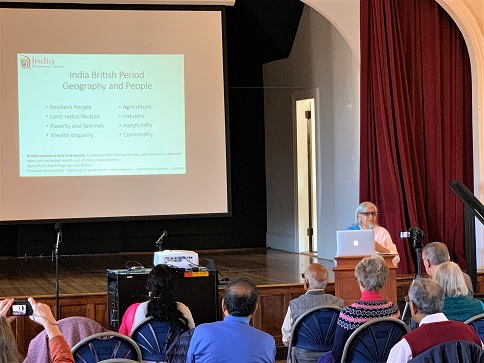
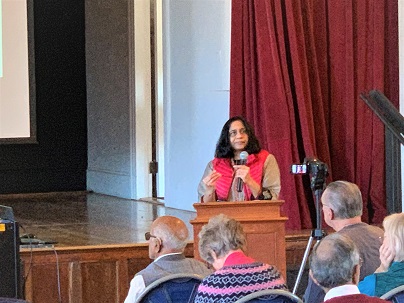
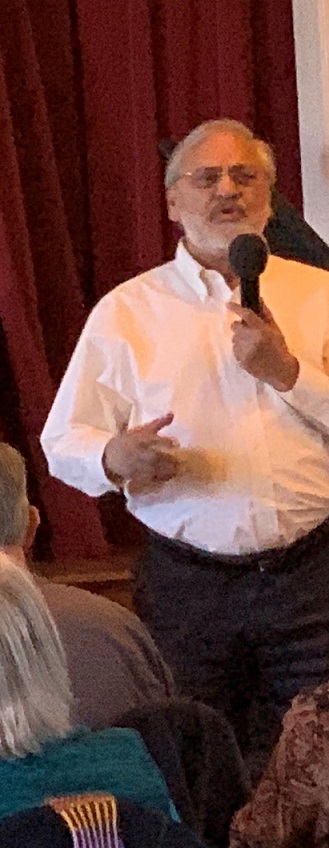
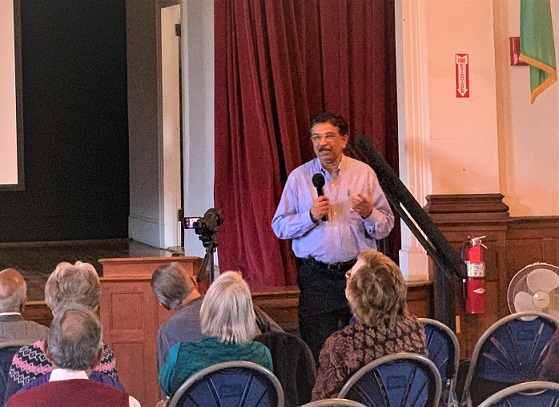
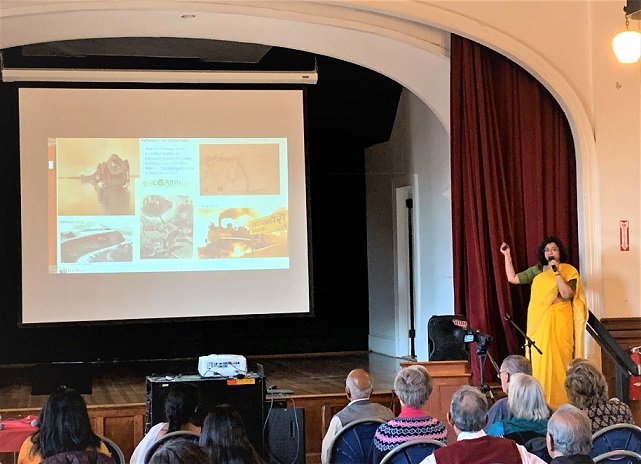
.jpg)